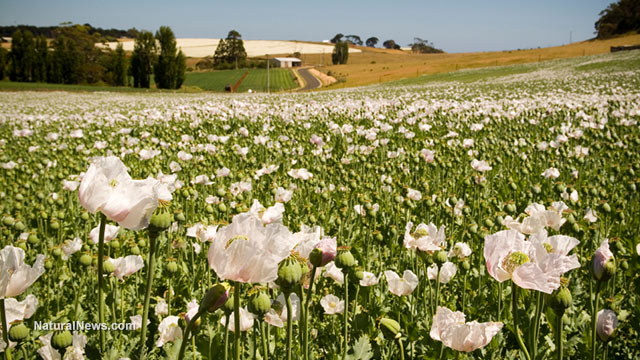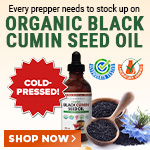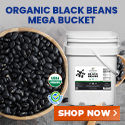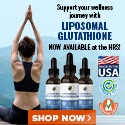GM poppies and the pharmaceutical industry threaten Tasmania's image of clean, green agriculture
Sunday, August 10, 2014 by: L.J. Devon, Staff Writer
Tags: GM poppies, pharmaceutical industry, Tasmania

- Newly released JFK files reveal Pentagon's role in creating Lyme disease and covid in the same lab
- DEADLY DECEPTION: How COVID vaccines increased mortality rates and why authorities hid the truth
- CDC finally halts $11 billion COVID funding scam as health officials admit the ‘pandemic’ was a fraud
- Here are TEN all-natural ways to protect your garden without using harmful chemicals
- GAIN-OF-FUNCTION CAT-BIRD-FLU now on the rise as nearly a dozen cats in Colorado "test positive" for Bird Flu due to contaminated cat food
- Ginseng's hidden anti-aging power: How compound K is rewriting the rules of skincare
- “Endgame: The Hidden Agenda 21” unveils a world of conspiracy and control
- ATTENTION PRESIDENT TRUMP: Please WITHDRAW your nomination of Dr. Susan Monarez for CDC Director as she is a VAX FANATIC and TOXIC JAB ZEALOT
- Senate Democrats deny censorship industrial complex existed, defend government's role in silencing dissent
- Scientists demand FDA withdraw mRNA COVID vaccines amid contamination and gene therapy concerns
- “The shame of Minnesota”: Somali immigrants behind $250 million child nutrition fraud in largest COVID-era scam
- L.A.'s rebuilding nightmare: Only 4 permits issued after fire destroys 6,000 homes
- Former Congresswoman exposes CCP's deep infiltration of California through universities, ports, and fentanyl
- Despite surge in MMR vaccination in Texas, measles outbreaks continue: Is VACCINE SHEDDING fueling the spread?
- PROCESSED TABLE SALT in foods found to fuel depression
- Chewing gum's dirty secret: How your daily habit could be flooding your body with microplastics
- Judicial bias exposed: Judge who blocked Trump's gang deportations attended secretive left-wing conference
- BPA: The hidden hormone disruptor sabotaging your health - and how to fight back
- Newly released JFK files reveal Pentagon's role in creating Lyme disease and covid in the same lab
- Elon Musk: Aliens could be here on Earth RIGHT NOW
- Festive flavors: The sweet history, nutritional profile and health benefits of pecan pie
- Trump reverses course on Gaza plan, says “nobody is expelling Palestinians”
- Reclaim your health: How midlife exercise reverses years of inactivity
- Big Pharma's $8 Billion bribery scheme exposed: how doctors are pushed to prescribe junk science, not heal
- Boys are back in town: Trump’s patriotic alpha crew takes the wheel while toxic females ride in the backseat
- EPA advisor admits the agency is funneling billions to climate groups ahead of Trump’s return to White House
- Space war brewing? Russia threatens to destroy Starlink satellites
- Survival 101: Effective EMF blocking techniques
- A lack of integrity in Academia: Harvard professor found GUILTY of fraudulent research to promote CRT theory
- Mike Adams Sermon 66: God will DESTROY ISRAEL for its wickedness
- 5 Simple steps to boost your brainpower: How to strengthen executive function in a distracted world
- Rep. Nancy Mace introduces bill to ban biological males from female facilities on federal property
- Sugarcane extract superior to cholesterol-lowering drugs?
- WHO focusing more on policing speech about public health and implementing global surveillance systems
- Pilots report mysterious lights 'moving at extreme speeds' across Oregon skies
- Dr. Mike Yeadon releases 15-minute testimony - WATCH - about genocidal intent of COVID “vaccines”
- EPA advisor admits the agency is funneling billions to climate groups ahead of Trump’s return to White House
- The Health Ranger releases “Vaccine Zombie” song and music video, using AI-animated zombies for the music video
- California's social media censorship law struck down: A victory for free speech or a threat to online safety?
- Dr. Mike Yeadon releases 15-minute testimony - WATCH - about genocidal intent of COVID “vaccines”
- The pandemic as a tool for INDOCTRINATION: Understanding “The Indoctrinated Brain” by Dr. Michael Nehls
- Florida takes a stand: DeSantis proposes permanent ban on mRNA vaccine mandates
- Mike Adams releases country western hit single: Goin’ Back in Time is Comin’ Home
- Mike Adams releases music poetry sensation: A Child of God
- “Why we influenced the 2020 elections”: Facebook files reveal the coordinated effort to bury the Hunter Biden laptop story
- RFK Jr. clears key hurdle: Sen. Susan Collins backs controversial HHS nominee, signaling a new era for health policy
- Unpacking the Lies That We’ve Been Fed – new song and music video released by Mike Adams, the Health Ranger
- Mike Adams releases new song and music video: Nothing More Disgusting Than a Globalist
- Newly released JFK files reveal Pentagon's role in creating Lyme disease and covid in the same lab
- Congratulations to the FULLY UNVACCINATED as you resisted the COVID-19 PROPAGANDA MACHINE fueled by over $100 BILLION
- Michigan sheriff announces criminal investigation into 2020 election crimes, Dominion Voting Systems
- Israeli soldiers accused of even more torture and abuse in the West Bank
- Migrants are taking advantage of recent hurricanes to scam residents and loot their homes
- House Intelligence Committee calls for the ARREST and PROSECUTION of Dr. Anthony Fauci
- Red Cross issues warning to stop blood plasma donations from vaccinated people
- Scientists confirm: GENIUS brain function can be spontaneously unleashed in humans without any apparent cause
- EPA advisor admits the agency is funneling billions to climate groups ahead of Trump’s return to White House
- HYSSOP: What research reveals about the health benefits of this ancient holy herb
- Two containers with completed ballots fall out of truck in Florida
- Fully vaccinated about to see “tsunami” of illness and death, warns virologist
- Global leaders unite to clamp down on “misinformation” with UN-backed Cascais Declaration
- BREAKING: 2025 NDAA authorizes mandatory military draft of WOMEN across America… as Pentagon pursues global NUCLEAR war with both Russia and China at the same time
- Michael Yon warns of a ZIONIST TAKEOVER in Trump’s second administration
- BOMBSHELL: DNA testing kits are a SCAM to develop ethnic-specific bioweapons
- Ozempic and Wegovy weight loss drugs are injectable LIZARD VENOM PEPTIDES that may unleash a devastating wave of organ failure… side effects align with symptoms of SNAKE BITES
- Israeli soldiers accused of even more torture and abuse in the West Bank
- These 13 countries just signed an agreement to engineer a global FAMINE by destroying food supply
- NASA admits that climate change occurs because of changes in Earth’s solar orbit, and NOT because of SUVs and fossil fuels
- RFK Jr. clears key hurdle: Sen. Susan Collins backs controversial HHS nominee, signaling a new era for health policy
- Sermon 30: How Jesus reveals Caesar’s FAKE CURRENCY and FALSE AUTHORITY
- Coriander seeds: Ancient medicine backed by modern science
- Arizona officials claim Maricopa County needs 10-13 days to tabulate results of the election
Over a decade ago, genetically modified organisms were banned from the island after GM canola drifted from test fields and contaminated other fields. Today, Tasmania represents organic agriculture, from the way it produces beef to the way it harvests poppies. For instance, on the island's northwest corner stands Tasmanian Alkaloids, a factory that produces 80 percent of the world's thebaine poppies. Their value would plummet in the presence of GMO contamination. Likewise, the island exports some of the most pristine organic beef to Japan from feedlots that do not use GMO animal feed. Up to 11,000 cattle at the Tasmania Feedlot help feed Japanese markets year-round, representing sustainable, non-GMO practices.
"They're looking for a very safe product, and a very consistent product," said the feedlot's Managing Director Andrew Thompson.
"GM is one of the main factors, along with no use of hormone growth promotants," he added. "We've got this great reputation of being safe and clean and I think we've got to enhance that into the future."
Pharmaceutical industry looking to expand and produce GMO poppies on Tasmania's clean, green agricultural landscape
Right now, the island's population, just over a half-million people, enjoy one of the cleanest places on Earth. The state's government plans to protect this serenity by extending the ban on GMOs. That all could change if a powerful pharmaceutical industry gets its way. The island's isolation and rugged wilderness could be carved up by a demanding GMO industry looking to expand its control with GM poppies.The introduction of genetically modified poppies onto the island of Tasmania would represent a boon to the pharmaceutical industry, allowing expansion of opiates for increased painkiller manufacturing. The competition of GM poppies could threaten the natural poppy industry itself, replacing organic farming methods with environmentally threatening methods including new pesticides. Also, how might these genetic alterations to the poppies change the very nature of the painkiller drugs? As global demand for painkillers increases, the pressure to adopt cheap GM poppy on the island could be inevitable.
UN figures show that demand for pain relief more than tripled between 1993 and 2012 across the world, with demand growing steadily since then.
Introducing GMOs on Tasmania would reduce biodiversity and devalue niche industries, including precious honey
The quality of the island's niche producers of wasabi, lavender, honey and wine would wane in the presence of an all-powerful GM poppy industry. The biodiversity on the island could very easily suffer. With the quality of these crops being contaminated, these niche natural industries will easily be overrun, as their prices plummet. Currently, honey on the island of Tasmania goes for prices at least 40 percent more than mainland honey. If GMOs are allowed onto the island, then the price of the honey would drop, as its quality is devalued by GMO contamination.As the third-largest exporter of beef and the fourth-largest wheat exporter in the world, Australia's decision to adopt GM poppies could forever shape the condition of their environment and the people who control the agriculture. Allowing GM poppies would most assuredly drive away the quality and value of the biodiversity on their land, ultimately allowing centralization of agricultural power in the hands of seed patent holders and seed scientists.
Sources for this article include:
http://www.newsdaily.com
http://science.naturalnews.com
GM poppies at FETCH.news
Get independent news alerts on natural cures, food lab tests, cannabis medicine, science, robotics, drones, privacy and more.
Take Action: Support Natural News by linking to this article from your website
Permalink to this article:
Embed article link: (copy HTML code below):
Reprinting this article:
Non-commercial use OK, cite NaturalNews.com with clickable link.
Follow Natural News on Facebook, Twitter, Google Plus, and Pinterest
Science News & Studies
Medicine News and Information
Food News & Studies
Health News & Studies
Herbs News & Information
Pollution News & Studies
Cancer News & Studies
Climate News & Studies
Survival News & Information
Gear News & Information
News covering technology, stocks, hackers, and more



"Big Tech and mainstream media are constantly trying to silence the independent voices that dare to bring you the truth about toxic food ingredients, dangerous medications and the failed, fraudulent science of the profit-driven medical establishment.
Email is one of the best ways to make sure you stay informed, without the censorship of the tech giants (Google, Apple, Facebook, Twitter, YouTube, etc.). Stay informed and you'll even likely learn information that may help save your own life."
–The Health Ranger, Mike Adams













































